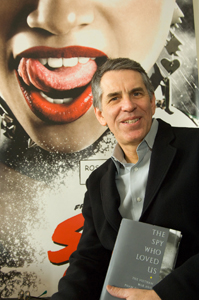Bass's Spy Who Loved Us: Truth More Thrilling than Fiction
 |
Thomas Bass relaxes in his office at UAlbany, holding his new book. The wall behind him is decorated with a Sin City movie poster. (Photo Mark Schmidt) |
Pham Xuan An was a political correspondent for Time magazine and its last bureau chief in Saigon. He observed the Vietnam War and reported on it, becoming close friends with American journalists and South Vietnamese generals, all the while leading a double life as a spy.
An, who gave advice to South Vietnamese military brass even as he spied for the North, is the subject of Thomas Bass's latest book, a real-life thriller. An, who had been a Communist since the 1950s, was never discovered and died of natural causes in 2006.
Bass teaches in the University's popular journalism major. His new book, The Spy Who Loved Us: The Vietnam War and Pham Xuan An's Dangerous Game, (Public Affairs) is as extraordinary as it is real.
The book received positive nods from Daniel Ellsberg, Ted Koppel, Morley Safer, and Seymour Hersh. Best-selling spy novelist John le Carr� was so engrossed in it, he read the book two times in as many weeks.
Koppel, Safer, and Hersh all wrote about the Vietnam War while it was happening, so their opinions carry weight with Bass. "I am glad they thought I got it right. I cared a great deal about recreating the original scene from the days of Vietnam," he said.
Uncovering the story was an arduous process. "When we write about spies and government secrets, these things are not customarily revealed � people would prefer to keep them hidden," he said. It took a half-dozen trips to Vietnam, the hiring of translators and research assistants, and years of sleuthing to dig up the Communists' spy network during the war.
The book, which was released Feb.16, is receiving rave reviews from Kirkus and Publishers Weekly.
Bass first wrote about Vietnam in 1996 in his book Vietnamerica: The War Comes Home. While working on that book, he was told that he should go meet An, who had an impressive library of books from the French colonial era and was a wonderful raconteur.
 |
Former Saigon news correspondent Pham Xuan An served as a spy for North Vietnam during the war. (Photo Charles Dharapak, Associated Press) |
He began his conversations with An in 1992, which led to a cover story in the May 23, 2005 double issue of The New Yorker. Once An passed away, his secrets could be revealed.
Why did Bass write this book? "It was an amazing story and it needed to be told. An was one of the great spies of the 20th century," said Bass, who won the Overseas Press Club's Cunningham Award for Best Magazine Reporting from Abroad, Honorable Mention, for his New Yorker piece in 2006.
That piece also highlighted An's love for his native Vietnam, and followed the skein of complex and seemingly contradictory threads in his life.
"He was a very successful reporter, but he was a hugely successful spy," said Bass of An. "He was North Vietnamese's secret weapon for winning the war."
Bass, who came to Albany in 2005, is teaching an undergraduate course on Vietnam this semester, which is reading books and watching films from the French colonial era to the present.
His students, said Bass, "are interested in Vietnam. They realize the war was an important moment in American history and we are still living with its unresolved legacy."
Bass believes a good investigative reporter is "tenacious, informed, and skeptical." With The Spy Who Loved Us, he teaches by doing.
![]() For more news, subscribe to UAlbany's RSS headline feeds
For more news, subscribe to UAlbany's RSS headline feeds


